
*When someone has impeccable character, it means that they are of the highest moral standards and are free from any wrongdoing. Naidu has abused his legal connection with the Fiji Times to spew out relentless propaganda on behalf of the Coalition parties before and after the election, and had ridiculed a court judgement on social media.
*As we pointed out previously, when Naidu spotted the word 'injection' instead of 'injunction' in a court judgment in which one of his colleagues was involved, he could have had a good laugh at the expense of the Judge in the Munro Leys office or better still, as a senior lawyer of so-called 'Impeccable Character', he could have written to the Chief Registrar and got the error corrected.
Instead, the NFP propagandist took to his Facebook and Twitter accounts and ridiculed the Judiciary, with others joining him.
*He, along with other lawyers and the Fiji Law Society, never stood up for lawyer Aman Ravindra-Singh, and stood down Singh after promising to have a cup of coffee in downtown Suva.
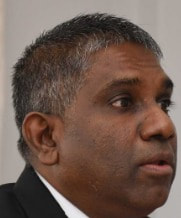 Justice Jude Nanayakkara | 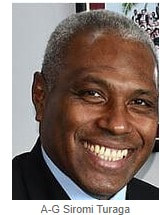 |  Ricahrd Naidu |  |
*In agreeing with Siromi Turaga that the scandalizing the court case against Naidu (where he ridiculed Goundar's brother Sri Lankan Judge) should NEVER have been brought to court, Goundar has opened the court and the judges for ridicule and abuse, as our tongue-in-cheek headline reads, 'Impeccable Character, Your A*se, Judge Goundar'.
* A-G Siromi Turaga cannot substitute the position that was taken by the A-G's Office with his own opinion, "I am of the view that these proceedings should never have been instituted in the first place".
Turaga gave no legal reason for his decision. Goundar glibly accepted it.
*It was wrong for Justice Goundar to even consider Turaga's opinion that these proceedings against Naidu should never have been instituted.
*Justice Goundar is also clearly saying in his judgment that the correct forum for the case was the Appellate Court and not the Trial Court?
*Why did the Fiji High Court (Trial Court) dismiss Naidu's conviction then?
*Why did Goundar venture into considering portions of the Sentencing and Penalties Act when Nadiu did not subject himself to a sentencing hearing?
*How can Goundar say at para.28 that Naidu is of Impeccable Character and that it was not necessary to call for Naidu to tender his mitigation?
* Since when has the Fiji courts begun to add their own opinion about litigants and their characters?
*How well does Goundar know RICHARD NAIDU to pass judgment on his character - the man who arrogantly sat on the Fiscal Review Committee as Chair while being a convicted lawyer?
*At the time of his application in court, he was guilty of contempt of court. He was guilty of scandalizing the Fijian judiciary?
*What is so impeccable about his character?
He was found guilty of this (he cleverly chose not to give evidence) - he was guilty of ridiculing judges.
*He was found guilty of making a mockery out of the court system and lowering the administration of justice.
*Yet Justice Goundar didn't care about the protection of the Bench accorded to it under the Constitution of Fiji.
*As for Naidu, “I think there is still a question that I still want to raise with the authorities on how this case ever got to this point, but that is something I will do in the course of time.” *Fijileaks:
Now, the Attorney-General has abused his powers to set you free.
*Both, Justice Goundar and Attorney-General Siromi Turaga have set a dangerous precedent by dismissing the charge of contempt, leaving the RFMF to ask if now is time to deploy S131 of the Constitution of Fiji.


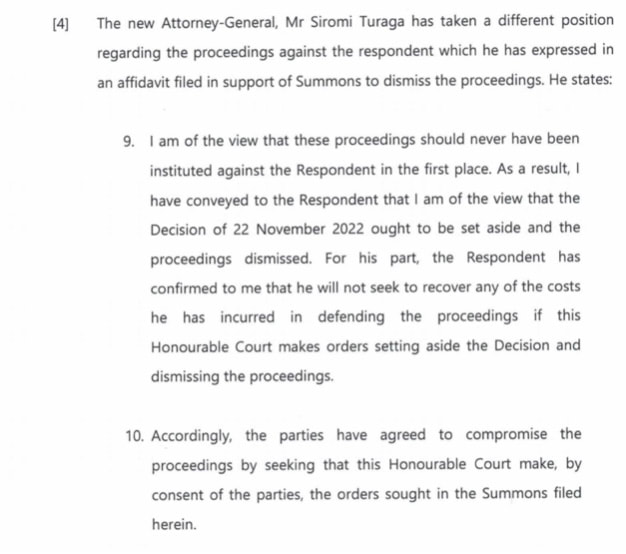
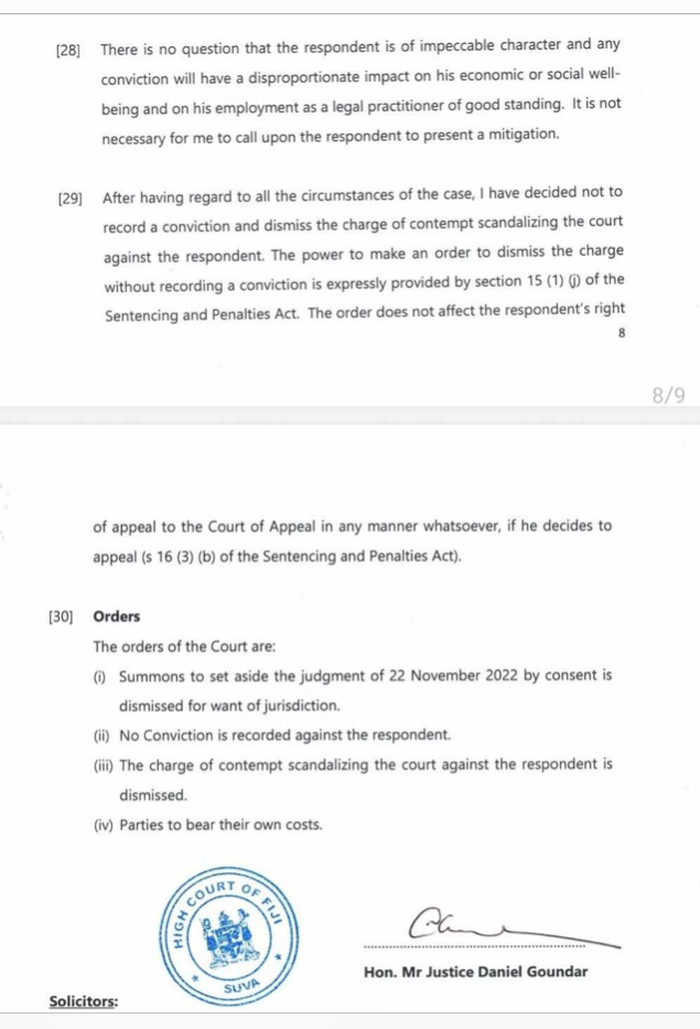
*Hanif Tuitoga Lawyers for the Attorney-General
*Munro Leys Lawyers for the Respondents
JON Apted, law partner with Richard Naidu at Munro Leys, is Sitiveni Rabuka's nominee to the Constitutional Offices Commission, whose chairman is Attorney-General SIROMI TURAGA
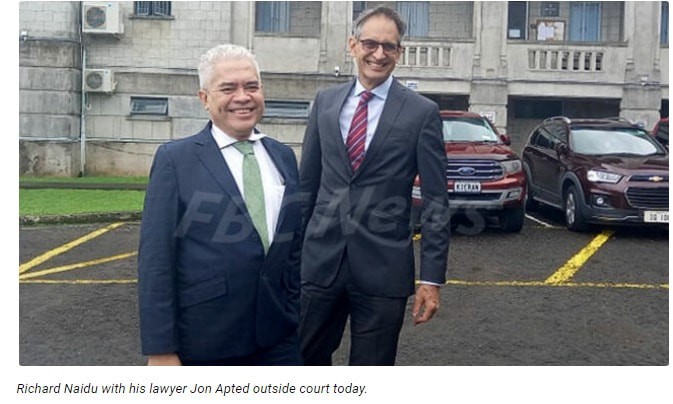
From Fijileaks Archive, 25 June 2023
JUDGE SHOPPING? Last Monday, the Fiji Law Society president Clarke was spotted having lunch together with the self-proclaimed CONVICTED LAWYER Richard Naidu at the foodhall above BSP Bank in Suva.
*As we chewed on Clarke's call for the Naidu negotiated Coalition government to transfer FICAC prosecution powers to the DPP, we wondered why Clarke had chosen not to comment and remain silent on Naidu's case that raise many fundamental legal questions.
*Of course, Clarke will retort with the usual 'bullsh*t' that the matter is before Justice Daniel Goundar in the Fiji High Court.
*Well, the first question that Clarke should have raised (and must) is why Naidu's case, which is a CIVIL MATTER, is being heard before Justice Goundar who presides over CRIMINAL MATTERS
*Richard Naidu's case should have been sent to JUSTICE ANJALA WATI who hears CIVIL MATTERS.
*It is right to ask if it could be because under criminal litigation Naidu's case can be retried?
*However, Naidu has been found guilty in a civil court thus he must be sentenced, and then only, he can appeal through the normal legal process.
*During submissions before Justice Goundar, he was reminded by Attorney-General's delegated lawyer Feizal Haniff that Naidu's case is a CIVIL MATTER?
*Naidu's lawyer and legal partner JON APTED also submitted that the proceedings were civil, governed by the High Court Rules of Civil Procedure. Apted is also Sitiveni Rabuka's nominee on the CoC.
*No wonder there is disquiet and a CRISIS OF CONFIDENCE in the judicial system, with lawyers and laymen asking whether this is not another case of JUDGE SHOPPING.
*Why is Haniff appearing for the A-G, when he (Haniff) began his legal career with Munro Leys and worked closely with Richard Naidu?
*Since Munro Leys and Naidu, the serial Coalition and NFP propagandist in the Fiji Times Opinion columns, are also legal advisers to the Fiji Times, we stand no chance to challenge Clarke, hence its here, in the Fijileaks, including the OPTIONS we had written some months ago that was available and not available to Naidu and his legal team.

In cases with a conviction, there are a couple of options
Option 1 The first option is for the parties to make submissions relating to sentencing and see how the Court sentences the Defendant. The matter is before Justice Daniel Goundar. Option 2 If the Defendant wants to set aside the conviction his lawyers could apply to arrest the Judgment similar to the powers under s. 239 of the Criminal Procedure Act 2009 i.e. Motion in arrest of judgment 239. — (1) The accused person may, at any time before sentence, whether on a plea of guilty or otherwise, move in arrest of judgment on the ground that the information does not, after any amendment which the court has made and had power to make, state any offence which the court has power to try. Option 3 If the Defendant wants the Court to discharge him even after he has been convicted using the principles under the Sentencing and Penalties Act he could apply to do the same. This is possible even where there has been a conviction i.e Release after conviction 44. — (1) A court may discharge a person whom it has convicted of an offence. Option 4 The Defendant could appeal against the conviction and any sentence and take his chances in the Fiji Court of Appeal.
(2) The court may, in its discretion, either hear and determine the matter during the same sitting, or adjourn the hearing of it to a future time to be fixed for that purpose.
(3) If the court decides in favour of the accused he or she shall be discharged from that information.
(2) A court, on convicting a person of an offence, may adjourn the proceedings for a period of up to 5 years and release the offender upon the offender giving an undertaking to comply with the conditions applying under sub-section (3), and any further conditions imposed by the court.
(3) An undertaking under sub-section (2) shall have conditions --
(a) that the offender shall appear before the court if called onto do so during the period of the adjournment, and if the court so specifies, at the time to which the further hearing is adjourned;
(b) that the offender is of good behaviour during the period of the adjournment; and
(c) that the offender observes any special conditions imposed by the court.
(4) A court may make an order for restitution or compensation in accordance with Part X in addition to making an order under this section.
(5) An offender who has given an undertaking under sub-section (1) may be called upon to appear before the court --
(a) by order of the court;
(b) by notice issued by a court officer on the authority of the court.
(6) If at the time to which the further hearing of a proceeding is adjourned the court is satisfied that the offender has observed the conditions of the undertaking, it must discharge the offender without any further hearing of the proceeding.


